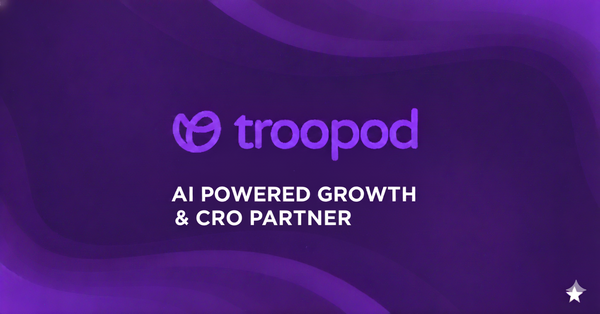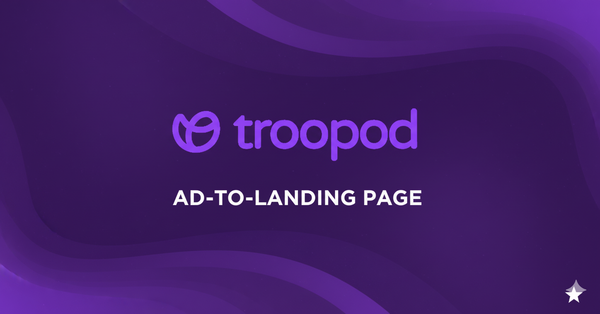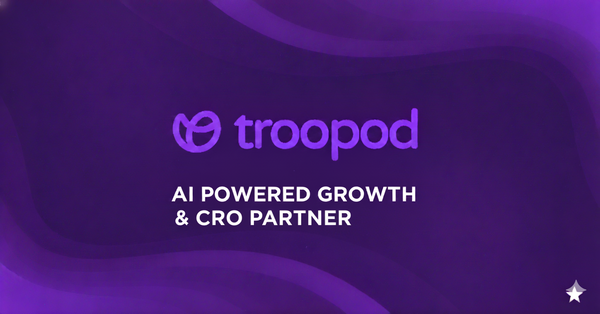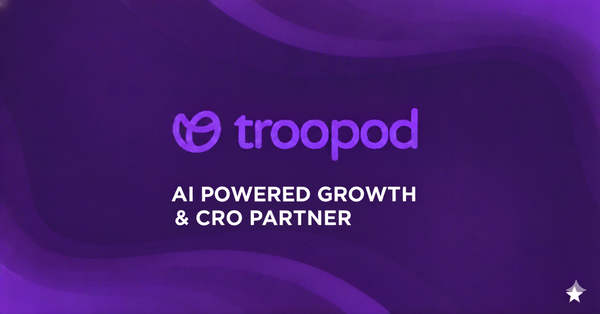CRO for Beginners: The 3-Step Framework to Start Optimizing Today
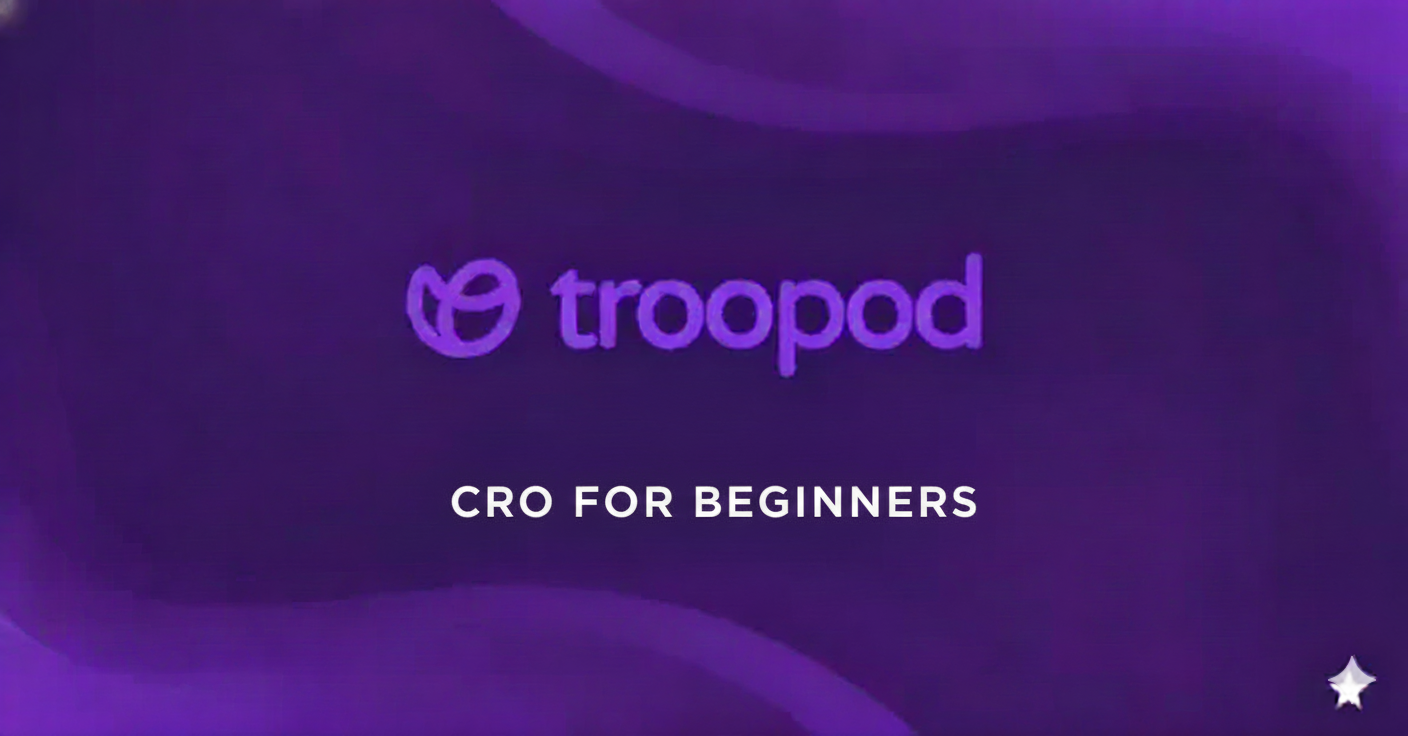
The ₹0 Budget, ₹8.4 Lakh Result
Rajesh, Mumbai: First-time Shopify store owner, ₹0 marketing budget
Month 1: Launched store
- Traffic: 2,400 visitors (organic + friends/family)
- Conversion: 0.6%
- Orders: 14
- Revenue: ₹33,600
"I need more traffic" (common beginner mistake)
Month 2: Learned basic CRO, applied 3-step framework
- Traffic: 2,600 visitors (8% organic growth)
- Conversion: 2.8% (+367%)
- Orders: 73 (+421%)
- Revenue: ₹175,200 (+422%)
Same traffic (essentially). 4.2x more revenue from CRO.
What changed: No ads. No fancy tools. No developer.
Just three steps:
- Measure (found problems)
- Fix (solved biggest problems first)
- Test (validated what worked)
6 months later:
- Traffic: 5,200/month (organic growth)
- Conversion: 3.4% (maintained)
- Monthly revenue: ₹6.0L
- Total improvement from CRO: ₹4.2L/month = ₹50.4L/year
After teaching CRO to 240+ beginner D2C founders, we discovered: Most beginners chase traffic before fixing conversion. This is backwards.
This is the complete beginner's guide to CRO—a simple 3-step framework you can start today.
Want guided CRO implementation? Book free coaching session with Troopod →
Part 1: What is CRO? (The Basics)
The Definition
CRO = Conversion Rate Optimization
Conversion Rate:
Conversion Rate = (Orders / Visitors) × 100%
Example:
100 visitors, 2 orders = 2% conversion rate
Optimization: Making changes to increase that percentage.
Why CRO Matters More Than Traffic
The Math:
Scenario A: Focus on Traffic
Month 1: 1,000 visitors, 1% conversion = 10 orders
Month 2: 2,000 visitors (paid ads), 1% conversion = 20 orders
Cost: ₹40,000 in ads
Net: 10 additional orders for ₹40K = ₹4,000 per order
Scenario B: Focus on CRO
Month 1: 1,000 visitors, 1% conversion = 10 orders
Month 2: 1,000 visitors (same), 2% conversion = 20 orders
Cost: ₹0
Net: 10 additional orders for ₹0 = FREE
Same result. One costs ₹40K. One is free.
Better: Combine Both
Month 3: 2,000 visitors, 2% conversion = 40 orders
(Traffic + CRO = multiplicative)
Common Beginner Mistakes
❌ Mistake #1: "I need more traffic first" Wrong. Fix conversion before scaling traffic. Why: More traffic × broken site = wasted money
❌ Mistake #2: "CRO is too complex for beginners" Wrong. Basic CRO is simple (this guide proves it).
❌ Mistake #3: "I need expensive tools" Wrong. Start with free tools (Google Analytics, Clarity).
❌ Mistake #4: "I'll optimize everything at once" Wrong. Focus on biggest problem first (80/20 rule).
❌ Mistake #5: "I'll redesign the entire site" Wrong. Small, focused changes win (test, don't guess).
The 3-Step CRO Framework
Step 1: MEASURE (Find the Problems)
Week 1: Set Up Tracking
Install Google Analytics 4 (FREE):
- Go to: analytics.google.com
- Create account → Create property
- Get tracking code
- Shopify: Settings → Apps → Install "Google & YouTube"
- Connect GA4
Enable Ecommerce Tracking (Shopify):
- Shopify does this automatically with GA4
- Verify: GA4 → Reports → Monetization → Ecommerce purchases
- You should see orders appearing
Install Microsoft Clarity (FREE):
- Go to: clarity.microsoft.com
- Sign up (free, unlimited)
- Create project
- Get tracking code
- Shopify: Online Store → Themes → Actions → Edit Code
- Theme.liquid → Paste code before
</head> - Save
Why Clarity:
- Heatmaps (see where users click)
- Session recordings (watch user journeys)
- Completely free, unlimited
- Essential for understanding problems
Week 2: Collect Baseline Data
Let tools run for 7-14 days minimum:
- Need 500+ visitors minimum
- 20+ conversions minimum
- More data = better insights
Document your baseline:
Baseline Metrics (Week 2):
Traffic: _____ visitors
Orders: _____
Conversion rate: _____%
AOV: ₹_____
Revenue: ₹_____
Top traffic sources: _____
Device split: ___% mobile, ___% desktop
Week 3: Analyze the Funnel
Your conversion funnel:
1. Homepage → 2. Collection Page → 3. Product Page → 4. Cart → 5. Checkout → 6. Order
Where do people leave?
GA4 Funnel Analysis:
- GA4 → Explore → Funnel exploration
- Build funnel:
- Step 1: page_view (home)
- Step 2: view_item (product)
- Step 3: add_to_cart
- Step 4: begin_checkout
- Step 5: purchase
Example Results:
100 visitors (homepage)
↓ 42 go to product page (58% leave!)
42 view product
↓ 5 add to cart (88% leave!)
5 add to cart
↓ 3 start checkout (40% leave!)
3 checkout
↓ 2 complete (33% leave!)
2 orders
Conversion: 2%
Biggest drop-off: Product page (88%)
Identify biggest leak:
- Homepage → Product: 58% drop (navigation issue?)
- Product → Cart: 88% drop (BIGGEST PROBLEM!)
- Cart → Checkout: 40% drop
- Checkout → Order: 33% drop
Focus on biggest leak first (product page in this example)
Week 4: Watch Session Recordings
Microsoft Clarity → Recordings
Watch 20-30 sessions, look for:
- Where do users click (that doesn't work)?
- Where do they hesitate (confusion)?
- Where do they leave (frustration)?
- What do they scroll past (never see)?
Common patterns beginners find:
1. "Add to Cart" not visible: Users scroll through product page, never see button
2. Small mobile buttons: Users tap, miss, tap again, frustrated
3. Confusing navigation: Users can't find products
4. Slow loading: Users wait, then leave
5. No trust signals: Users hesitate, don't trust site
Bangalore Fashion beginner findings:
- Watched 25 recordings
- Found: 18/25 never scrolled past hero image
- Problem: Products not visible above fold
- Fix: Moved product grid higher
- Result: +42% product page views
Step 2: FIX (Solve the Biggest Problems)
Priority Framework:
Fix in this order:
- Critical: Blocking conversions (broken checkout, button not visible)
- High Impact: Biggest funnel drop-off (88% leaving product page)
- Quick Wins: Easy fixes with good ROI (trust badges, button size)
- Nice-to-Have: Minor improvements (color tweaks, copy)
The Top 10 Beginner Fixes
Fix #1: Make "Add to Cart" Visible Above Fold
Problem: Button requires scrolling to see Solution: Move higher in page layout Time: 30 minutes Impact: +40-80% add-to-cart rate
Fix #2: Enable Guest Checkout
Problem: Forcing account creation Solution: Shopify Settings → Checkout → "Accounts optional" Time: 2 minutes Impact: +35-50% checkout completion
Fix #3: Add Trust Badges
Problem: No visible trust signals Solution: Add "Free shipping • Easy returns • Secure payment" above button Time: 20 minutes Impact: +25-40% conversion
Fix #4: Enlarge Mobile Buttons
Problem: 32px buttons (too small for thumbs) Solution: Make all buttons 56px height minimum Time: 15 minutes Impact: +60-100% mobile conversion
Fix #5: Show Star Ratings Above Fold
Problem: Reviews at bottom (18% see them) Solution: Show star rating next to price Time: 15 minutes Impact: +30-50% conversion
Fix #6: Reduce Checkout Form Fields
Problem: 12+ form fields Solution: Reduce to 4 essential fields Time: 30 minutes Impact: +40-80% checkout completion
Fix #7: Add Product Images
Problem: Only 1-2 product images Solution: Add 6-8 images (lifestyle + details) Time: 2 hours (photography) Impact: +40-70% product page conversion
Fix #8: Improve Navigation
Problem: Confusing menus Solution: Simple categories, clear labels Time: 1 hour Impact: +30-50% product discovery
Fix #9: Speed Up Site
Problem: 5+ second load time Solution: Compress images, remove unused apps Time: 2 hours Impact: +40-80% (speed = conversion)
Fix #10: Add Scarcity Messaging
Problem: No urgency Solution: "Only X left in stock" for popular items Time: 30 minutes Impact: +20-35% urgency-driven conversions
Implementation Priority (Week 1):
- Enable guest checkout (2 min) - Do this first!
- Make buttons visible (30 min)
- Add trust badges (20 min)
- Show star ratings (15 min)
Total: 67 minutes, expected +50-80% conversion
Week 2: 5. Enlarge mobile buttons (15 min) 6. Reduce form fields (30 min) 7. Add more product images (2 hours) 8. Improve navigation (1 hour)
Total: 3.75 hours, expected +80-120% cumulative
Delhi Skincare beginner journey:
Week 1: Baseline - 1.2% conversion
Week 2: Fixed 4 quick wins - 2.1% conversion (+75%)
Week 3: Added 4 more fixes - 3.2% conversion (+52% more)
Week 4: Tested & optimized - 3.6% conversion (+13% more)
Total: 1.2% → 3.6% (+200%)
Time: 12 hours total
Cost: ₹0
Step 3: TEST (Validate What Works)
Why Testing Matters:
Without testing: "I think this will work" → Ship it → Hope it works → Don't know if it did
With testing: "I think this will work" → Test it → Measure impact → Know what works
Simple A/B Testing for Beginners
What to test:
- Button text ("Buy Now" vs "Add to Cart")
- Button color (green vs orange)
- Image order (lifestyle first vs product first)
- Trust badges (with vs without)
- Product descriptions (short vs detailed)
How to test (Free Method):
Week 1: Run version A only, measure:
- 1,000 visitors
- Conversion: 2.2%
- Orders: 22
Week 2: Run version B only, measure:
- 1,000 visitors
- Conversion: 2.8%
- Orders: 28
Winner: Version B (+27% improvement)
Keep version B, test next element
Google Optimize (FREE A/B Testing):
- Sign up: optimize.google.com (free)
- Create experiment
- Install snippet (connect to GA4)
- Create variant (make changes)
- Start test
- Wait for statistical significance
- Implement winner
Sample size needed:
- Minimum: 1,000 visitors per variant
- More is better (2,000-5,000 ideal)
Bangalore Jewelry beginner tests:
Test 1: Button color
Control (blue): 2.4% conversion
Variant (orange): 2.9% conversion
Winner: Orange (+21%)
Keep orange, move to next test
Test 2: Trust badges
Control (no badges): 2.9% conversion
Variant (trust badges): 3.6% conversion
Winner: Trust badges (+24%)
Keep badges, move to next test
Test 3: Product images
Control (2 images): 3.6% conversion
Variant (6 images): 4.8% conversion
Winner: 6 images (+33%)
Keep 6 images, move to next test
Cumulative: 2.4% → 4.8% (+100%)
What NOT to test (as beginner):
❌ Complete redesign (too many variables) ❌ Changing 10 things at once (can't tell what worked) ❌ Minor color shades (low impact) ❌ Footer changes (low visibility)
What TO test:
✓ High-visibility elements (buttons, headlines) ✓ One change at a time (clear causation) ✓ High-impact areas (product page, checkout) ✓ Obvious improvements (mobile optimization)
Part 2: The 30-Day Beginner Plan
Week 1: Setup & Measure
Monday-Tuesday: Install tracking
- [ ] Google Analytics 4 installed
- [ ] Ecommerce tracking enabled
- [ ] Microsoft Clarity installed
- [ ] Baseline metrics documented
Wednesday-Sunday: Collect data
- [ ] Let tools run (need 7 days minimum)
- [ ] Don't make any changes yet
- [ ] Watch 10-15 session recordings
- [ ] Note obvious problems
End of Week 1: You should know:
- Current conversion rate: ____%
- Biggest funnel drop-off: _____
- Top 3 obvious problems: _____, _____, _____
Week 2: Quick Wins
Monday: Critical fixes (2 hours)
- [ ] Enable guest checkout (2 min)
- [ ] Move "Add to Cart" above fold (30 min)
- [ ] Add trust badges (20 min)
- [ ] Enlarge mobile buttons (15 min)
- [ ] Show star ratings next to price (15 min)
Expected: +40-60% conversion by end of Monday
Tuesday-Friday: Continue fixing
- [ ] Reduce checkout form fields (1 hour)
- [ ] Add more product images (2-4 hours)
- [ ] Speed up site (compress images) (1 hour)
- [ ] Improve navigation (1 hour)
Saturday-Sunday: Measure impact
- [ ] Check new conversion rate
- [ ] Compare to Week 1 baseline
- [ ] Calculate revenue impact
Expected by end of Week 2: +60-100% conversion improvement
Week 3: Testing & Optimization
Monday-Wednesday: Set up first A/B test
- [ ] Choose element to test (button color/text)
- [ ] Create variant
- [ ] Start test
- [ ] Let run for 7 days minimum
Thursday-Friday: Additional fixes
- [ ] Optimize mobile further
- [ ] Add urgency messaging
- [ ] Improve product descriptions
- [ ] Add customer photos (if you have them)
Saturday-Sunday: Analysis
- [ ] Watch more session recordings
- [ ] Identify next problems to fix
- [ ] Plan Week 4
Week 4: Iterate & Scale
Monday-Friday: Implement test winners
- [ ] Check A/B test results
- [ ] Implement winner
- [ ] Start next test
- [ ] Continue optimizing
Saturday-Sunday: 30-day review
- [ ] Compare Day 1 vs Day 30
- [ ] Calculate total improvement
- [ ] Document what worked
- [ ] Plan next 30 days
Expected by Day 30: +80-150% conversion improvement
Part 3: Real Beginner Success Stories
Story 1: Priya, Bangalore - Handmade Jewelry
Background:
- First Shopify store
- No CRO knowledge
- ₹0 marketing budget
- Month 1: 0.8% conversion
Applied 3-step framework:
Week 1: Measured
- Installed GA4 + Clarity
- Found: 82% bounce on homepage (people lost)
- Problem: No clear product categories
Week 2: Fixed
- Added clear navigation (Rings, Earrings, Necklaces)
- Moved product grid higher (above fold)
- Added "handmade" trust messaging
- Enlarged mobile buttons
Week 3: Tested
- Tested product page layouts
- Added lifestyle images
- Winner: +42% product page conversion
Results after 30 days:
Conversion: 0.8% → 2.6% (+225%)
Monthly revenue: ₹48K → ₹156K (+225%)
Time invested: 16 hours
Cost: ₹0
6 months later:
- Conversion maintained at 2.8%
- Monthly revenue: ₹4.2L (organic growth + CRO)
- Total CRO impact: ₹3.0L/month = ₹36L/year
Story 2: Arjun, Delhi - Fitness Supplements
Background:
- Launched store, low conversion (1.1%)
- Spending ₹25K/month on ads
- Barely breaking even
Applied 3-step framework:
Week 1: Measured
- Found: 74% abandon at checkout
- Problem: 14 form fields + forced account
Week 2: Fixed
- Enabled guest checkout → Instant +28% improvement
- Reduced to 4 form fields → Another +34%
- Added trust badges (supplement safety concerns)
- Made mobile buttons larger
Week 3: Tested
- Tested different trust messages
- Tested product image order
- Added before/after photos (social proof)
Results after 30 days:
Conversion: 1.1% → 3.4% (+209%)
Same ad spend: ₹25K
Before: ₹66K revenue → ₹25K profit
After: ₹204K revenue → ₹179K profit (+616%)
6 months later:
- Scaled ad spend to ₹80K/month (profitable now)
- Conversion stable at 3.2%
- Monthly revenue: ₹8.4L
- Monthly profit: ₹4.2L
Story 3: Neha, Pune - Kids Clothing
Background:
- Side hustle, weekends only
- 1,200 monthly visitors (organic + Instagram)
- 0.9% conversion (too low)
Applied 3-step framework (part-time):
Week 1-2: Measured (weekends)
- Session recordings showed: Mobile users struggling
- 87% mobile traffic, but 0.6% mobile conversion
- Problem: Desktop site on mobile (terrible UX)
Week 3-4: Fixed (weekends)
- Made entire site mobile-first
- Enlarged all buttons (56px)
- One-column layout
- Sticky "Add to Cart"
- Reduced form fields
Week 5-6: Tested
- Tested product page layouts for mobile
- Tested trust message variations
- Added customer photos (kids wearing products)
Results after 6 weeks (part-time):
Mobile conversion: 0.6% → 2.4% (+300%)
Overall conversion: 0.9% → 2.2% (+144%)
Monthly revenue: ₹32K → ₹78K (+144%)
Time invested: 20 hours (weekends)
Cost: ₹0
Key lesson: Part-time CRO still works. Focus on mobile (87% of traffic).
Part 4: Beginner Tools & Resources
Essential (FREE) Tools
1. Google Analytics 4
- Purpose: Track everything
- Cost: Free
- Must-have: Yes
2. Microsoft Clarity
- Purpose: Heatmaps + recordings
- Cost: Free, unlimited
- Must-have: Yes
3. Google Optimize
- Purpose: A/B testing
- Cost: Free
- Must-have: For testing phase
4. Shopify Analytics
- Purpose: Basic ecommerce metrics
- Cost: Included with Shopify
- Must-have: Yes (you already have it)
Total cost: ₹0
Optional (Paid) Tools
When you're ready to level up:
1. Hotjar (₹2K/month)
- Better than Clarity (more features)
- Session limits (3,000 on basic)
- Upgrade when: Revenue >₹5L/month
2. Klaviyo (₹8K-18K/month)
- Email marketing automation
- Better than generic email
- Upgrade when: 1,000+ customers
3. Troopod (₹10-15L/year)
- AI personalization + full CRO
- All-in-one platform
- Upgrade when: Revenue >₹50L/month, ready to scale
Free Learning Resources
1. Google Analytics Academy
- Free courses
- Learn GA4 properly
- analytics.google.com/analytics/academy
2. Shopify Blog
- Free CRO guides
- Ecommerce best practices
- shopify.com/blog
3. YouTube Channels:
- "Conversion Rate Optimization" (CXL)
- "Shopify Ecommerce" (Oberlo)
- "CRO for Beginners" (Neil Patel)
4. This blog!
- Read other Troopod CRO guides
- All free, actionable
- blog.troopod.io
The Bottom Line
CRO isn't complex. Start simple.
The 3-step framework:
- MEASURE (Find problems) - Week 1-2
- FIX (Solve problems) - Week 3-4
- TEST (Validate solutions) - Ongoing
Expected timeline:
- Week 1: Baseline measurement
- Week 2: Quick wins (+40-60%)
- Week 3: More fixes (+60-100% total)
- Week 4: Testing & optimization (+80-150% total)
Expected results (first 30 days):
- Conversion improvement: +80-150%
- Revenue improvement: +80-150%
- Time investment: 12-20 hours
- Cost: ₹0 (free tools)
Real beginner results:
- Rajesh (Mumbai): 0.6% → 2.8% (+367%), ₹50.4L annual impact
- Priya (Bangalore): 0.8% → 2.6% (+225%), ₹36L annual impact
- Arjun (Delhi): 1.1% → 3.4% (+209%), profit +616%
The beginner advantage: Most stores have obvious problems. Fix obvious = huge gains.
Don't chase traffic. Fix conversion first.
Need help getting started? Book free CRO coaching session with Troopod →
About Troopod:
We teach + implement CRO for Indian D2C brands. Start with free tools (this guide), upgrade to Troopod when ready to scale (₹50L+ monthly revenue). We meet you where you are.


